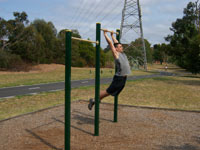Do you do it to keep fit? How about to lose weight? Do you exercise because you think you should? Is it a vanity thing? Perhaps you're an athlete and it's a requirement?
There's no right or wrong reason why you exercise, but thinking about your motivation will go a long way to helping you achieve your goals.
Think about it this way - how can you reach your goals if you don't know what is motivating you to put in the effort in the first place? You can take this approach to almost anything important in your life - your job, your hobbies, your relationships...

So, why do you exercise? (Take a moment to think it through.)
Once you determine the reason for all the effort that you are putting in, you can assess if your current training is adequate, applicable and worthwhile. You can make a plan to reach you goals (one that will work because it has meaning) and you can achieve those goals.
Any questions? Get in touch.









Post a Comment
Create a Link
<< Home